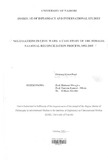| dc.description.abstract | This thesis is located in the post cold war period which has witnessed an increase in internal conflicts as opposed to inter-state ones especially in Africa. The civil wars also referred to as 'new wars' defy efforts to manage them raising the question on whether they can terminate through negotiations. The problem this study set to investigate is whether a protracted conflict like the one in Somalia can end through negotiations and if so what would be the conditions under which it may terminate successfully. It is within this context that a need to scrutinize the 14th Somalia National Reconciliation effort is necessary as a way of determining the variable that influence success or failure of negotiations under such circumstances.
Departing from other negotiations this initiative involved factions alone. Conceptually, first the objective of the study was to accurately give an accurate historical account of the Somalia National Reconciliation Conference. Secondly, it was. to investigate factors that determine success or failure of negotiations involving factions alone and thirdly, to determine whether there are other factors apart from ripeness that influence success or failure of negotiations. The study set to test the assumption that willingness and readiness are likely to influence success or failure of negotiations involving factions alone. In pursuit of these objectives and hypothesis the study adopted a methodology t with three component tools of analysis.
The first was secondary data analysis. This involved a critical review of both published and unpublished materials on negotiation theory and Somalia. The instruments employed in this case were within case analysis and cross case analysis. The two instruments highlighted new variables in the case study as well as capturing comparative perspectives that determined the conclusion. The second component involved interviews with various delegates, participants and key informants. The third methodological component was the focused group discussions with select participants on the basis of their knowledge. and expertise. Within the last two components both qualitative and quantitative aspects of research procedures were used.
The main finding of the study from this data is that success or failure of negotiation depends on willingness and readiness especially where multiple mediators and factions are involved. To the extent that the two variables help to improve coordination and mobilization in negotiations the chances for success are enhanced. Drawing from the finding the study concludes that future negotiations involving regional institutions like lOAD with diverse interests should be coordinated and that calls for factoring willingness and readiness both within party dynamics and other actors in order to avoid confusion. This implies thatthere is need for two levels of negotiations. The first involving the multiple mediators meant to bring about the unity of purpose, and the second, with the factions for purposes of mutually resolving their conflict. Conceptually this informs the idea of dual willingness and readiness within a systemic approach in conflict management. | en_US |

